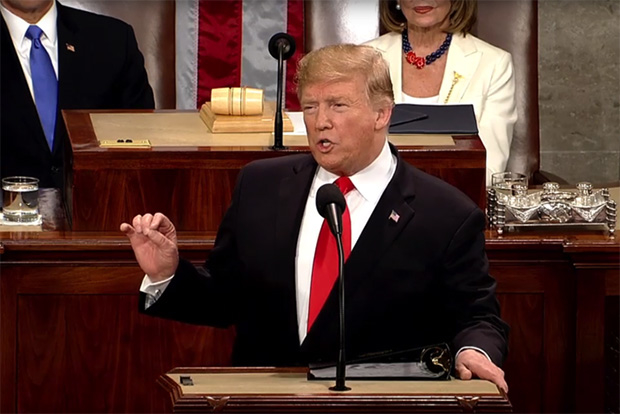A Theater Critic Reviews…Trump's State of the Union Address

(© The White House)
When Donald Trump took the podium for last night's State of the Union Address, he was stepping onstage for our federal government's biggest theatrical event. From the scripted emotion to the coordinated costumes to the special guest stars, the State of the Union is grand theater, and its participants last night knew it: The rapturous applause of Republicans was more ecstatic than that of the most devoted Hamilton fans at the Richard Rodgers Theatre. The State of the Union is a dramatic spectacle, requiring its own drama criticism.
The staging alone is worthy of commentary, with the president delivering the entire speech flanked by the vice president and Speaker of the House. It's an imposing formation in times of unified government, but when one of those wingmen has been deemed "The Shadow President," and the other is Nancy Pelosi, it's a bit like having Statler and Waldorf seated behind you as you attempt to perform Hamlet — and Donald Trump is no Laurence Olivier.
The president is charismatic when he's improvising, but it all evaporates when he's on book. Days of reported rehearsal mitigated that somewhat last night. True, President Trump's performance was marked by certain indelible habits that would turn any acting teacher blue in the face: Breaths barged uninvited into the middle of phrases as he pinched the air with his right hand — but we're used to this strange choreography by now.
The president's content was as expected as his form. Viewers hoping to tune in to their regularly scheduled programs would not have been disappointed by the stories of drugs, sex, and violence he trotted out, which could have formed the basis of any episode of Law & Order. These were pretexts he used to once again attempt to sell his border wall, a project for which he has found a renewed interest now that his party no longer controls the House of Representatives.
He caused viewers to do a double take when he said, "I want people to come into our country in the largest numbers ever, but they have to come in legally." This came as news to both those impacted by his travel ban and, apparently, his speechwriters, who loaded no such thing into the teleprompter. I attribute the ad-lib to the muscle memory of a man conditioned to unconditionally speak in the superlative.
Tempering contention with consensus, President Trump devoted time to topics with which few could disagree, promising to wipe out HIV/AIDS and childhood cancer. While some Democrats remained unmoved, most couldn't help but stand and clap for such feel-good proposals. World War II veterans and Buzz Aldrin also got standing ovations, with the full chamber singing "Happy Birthday" to 81-year-old Holocaust and Pittsburgh massacre survivor Judah Samet.
Playing her role as antagonist-in-chief, Speaker Nancy Pelosi responded to Trump's speech by pretending to read from the prepared script in her hands when he was saying something she didn't care for, and clapping precariously close to the president's head when he did.
Mike Pence received the speech with his typical stoicism: Maybe he was listening and maybe he was planning his outfit for his emergency swearing-in ceremony, but by taking his cues from house right, he never failed to hail the chief (for now).
The most striking costume choice of the evening came from the women of the house Democratic caucus: Adorned in suffragist white, they formed a visible sea of opposition to the president. Mostly stern and disapproving, they erupted into cheers when he noted the record number of women in the workforce.
Overall, it was one of President Trump's better performances: He gave his supporters cover by feinting toward bipartisanship while delivering a hard right hook on divisive issues like immigration and abortion. If the goal was to gather footage of Kamala Harris, Bernie Sanders, and the 20 other Congressional Democrats running for president giving stank face as President Trump called for the end of drug cartels and Bolívarian Socialism, he got what he was after — but it's a testament to our low expectations that this is what winning looks like.
And the Democratic Response…
The losing candidate for last year's Georgia gubernatorial race (and possible 2020 Senate candidate), Stacey Abrams similarly benefited from low expectations: She took one of the hardest gigs in politics and managed to avert total disaster.
That didn't look assured from the outset: Backed by a phalanx of supporters who looked like they might break into "We Are the World," she opened the speech by wishing us a happy Lunar New Year, as opposed to the more recognized Chinese New Year, like she was running for governor of the moon.
But Abrams grabbed hold of our attention by hitting on topics that were oddly absent from the president's speech: Gun violence, depressed wages, voter suppression, and (most glaringly) the government shutdown that saw 800,000 federal workers go without pay for a month and had certain producers offering relief in the form of free tickets.
Her speech still arrived as an unnecessary second act on a show that works better at 90 minutes, no intermission, but Abrams committed to the role. I look forward to seeing her in future productions.










